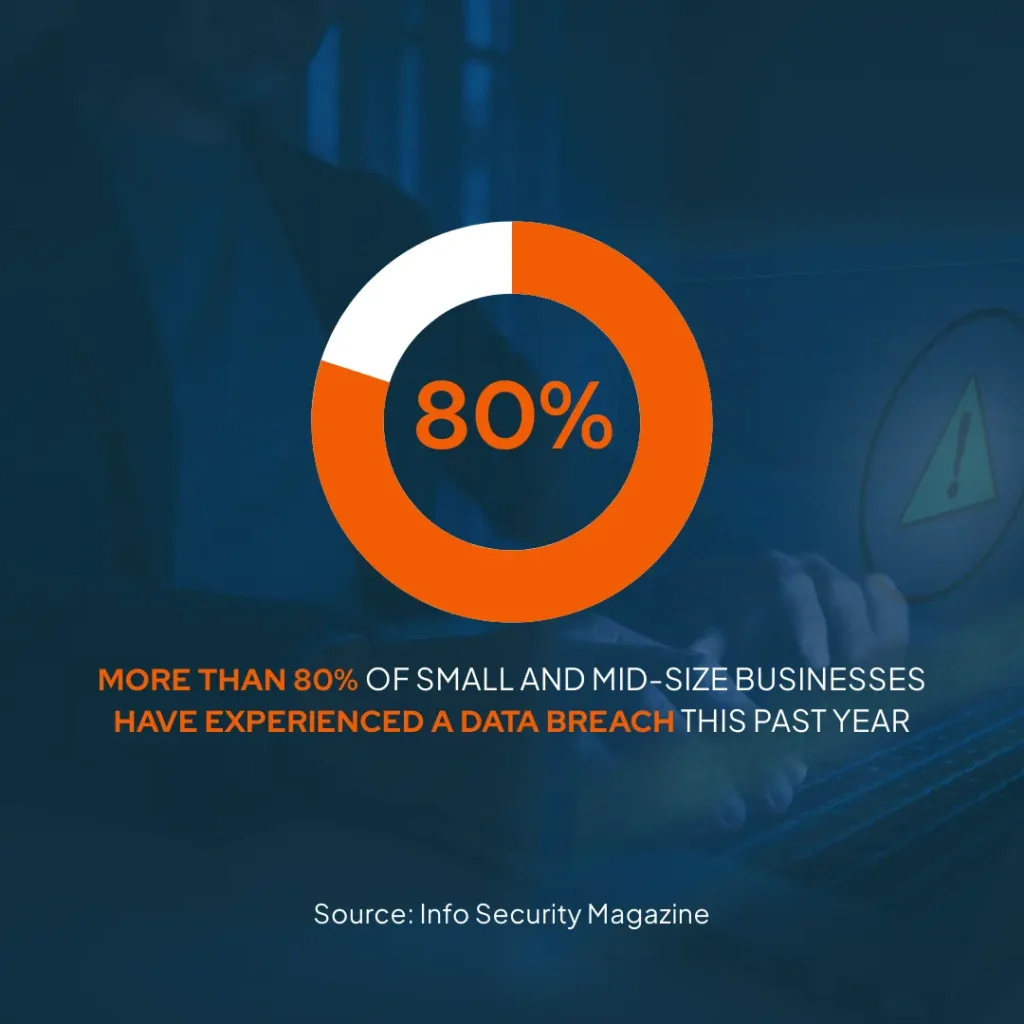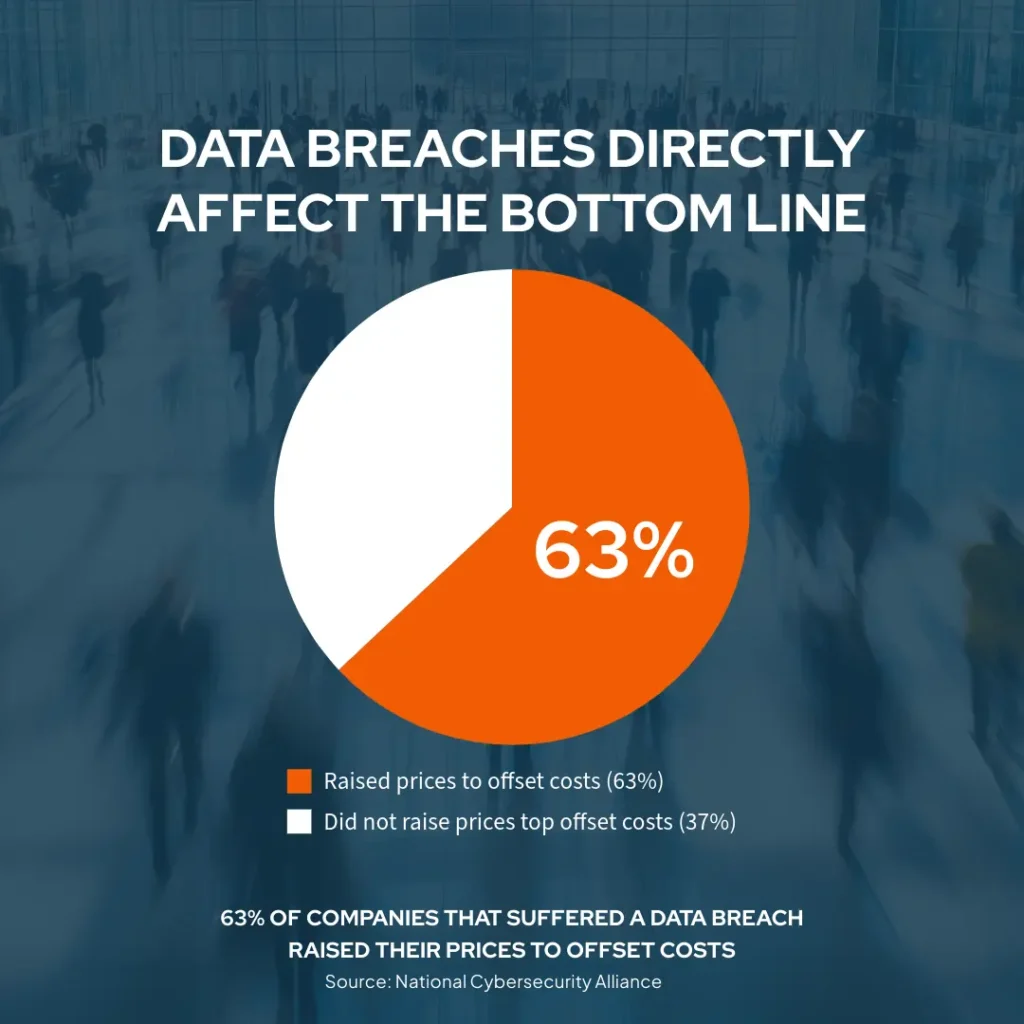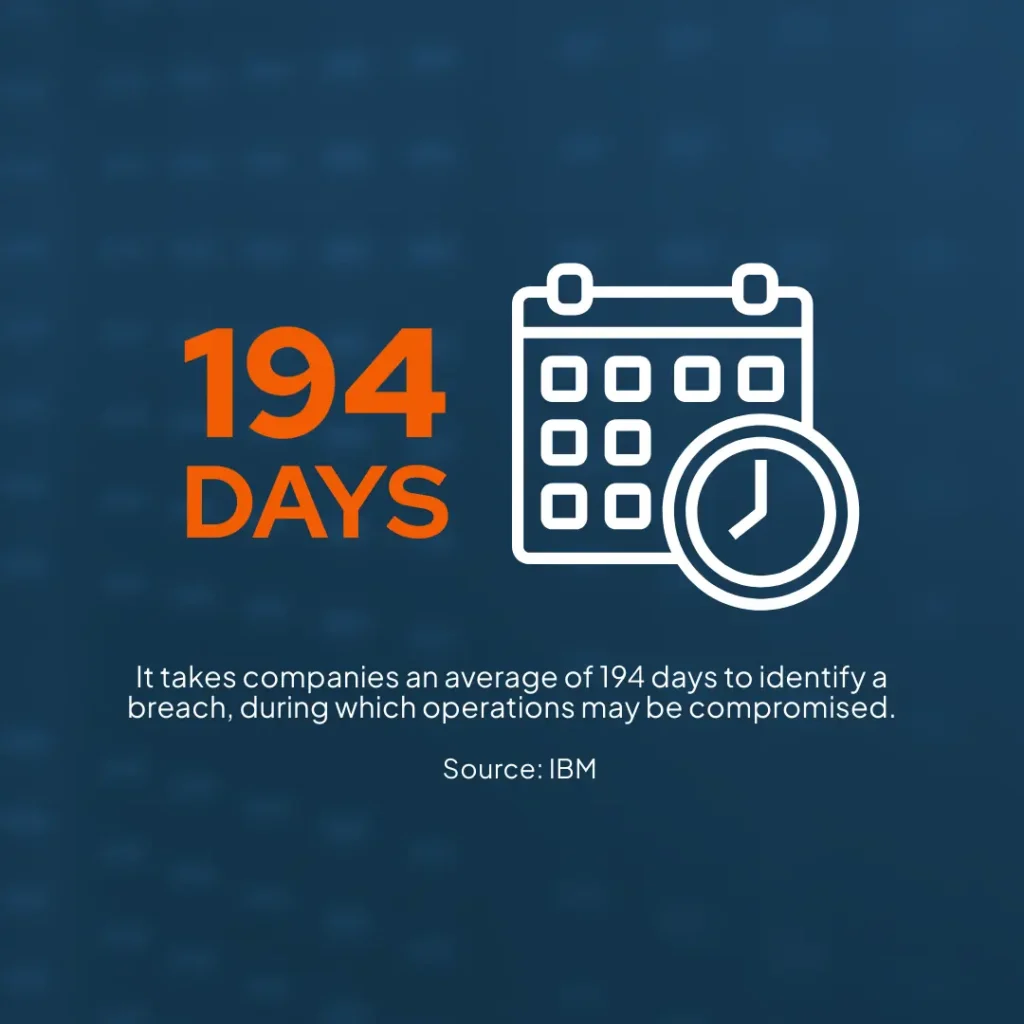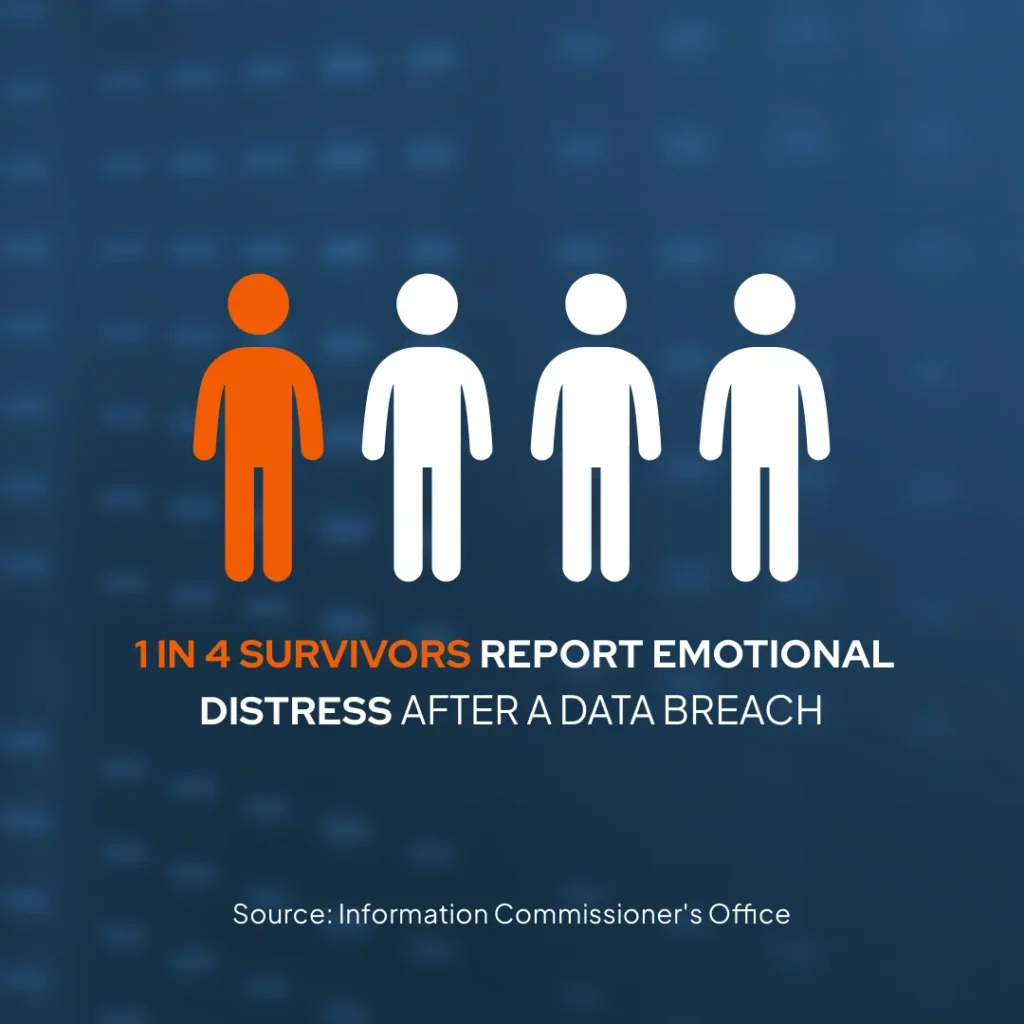Data breaches have become one of the most pressing threats to businesses worldwide, and most are unprepared. The first half of 2024 saw more than 7 billion records exposed, further amplifying the urgency to secure sensitive data and have a data breach response plan in place. For small and mid-sized businesses, these risks pose particularly devastating consequences.
The following data breach statistics reveal the rising costs and risks associated with data breaches and why businesses must prioritize data protection now.
Understanding the Current Landscape of Data Breaches
The threat of data breaches has evolved dramatically in recent years, becoming more widespread, sophisticated, and costly. Understanding the scale of the issue is essential for any business looking to avoid falling victim to a breach.

Record-Breaking Numbers
More than 80% of small and mid-size businesses have experienced a data breach this past year with the financial impact having escalated significantly. An Identity Theft Resource Center report reveals that financial losses for businesses exceeding $500,000 due to a data breach have more than doubled in the last year.
The vast scale of these breaches underscores a critical issue: no business, regardless of size, is safe from the threat of cyberattacks.
Top Three Industries at Risk
The sensitive nature of data in certain industries makes them particularly vulnerable to data breaches. Let’s take a look at the top three most affected industries:
1. Healthcare: Leading with 809 compromises in 2023, healthcare continues to be a prime target for cybercriminals, driven by the value of patient data on the black market. Additionally, healthcare data breaches have seen an alarming 53.3% increase in associated costs since 2020. Hidden costs also take a toll. On average, hospitals increase advertising spending by 64% in the two years following a breach to regain patient trust and restore their reputation.
2. Financial Services: With 744 compromises, the financial sector remains a favorite target due to the wealth of sensitive financial information it stores. Data breaches in this sector often result in significant financial losses and reputational damage.
3. Professional Services: The professional services industry, with 308 breaches, is also a major target. These companies often handle valuable intellectual property, making them attractive to cybercriminals seeking financial gain through ransomware or data theft.
The Financial Impact of Data Breaches
The financial fallout from a data breach can be catastrophic, particularly for small and medium-sized businesses. The costs go far beyond immediate monetary losses and can take years to fully recover from.

These Four Statistics Show the Rising Costs of Data Breaches for Businesses
- The global average cost of a data breach has grown to $4.88 million.
- In 2023, the United States led all countries and regions globally for the 13th year in a row with an average cost per data breach of $9.36 million.
- Customer churn and damaged reputation from a data breach cost businesses an average of $1.52 million in 2023.
- A recent study showed that 63% of companies that suffered a data breach raised their prices to offset costs.

Three More Reasons Why the Impact on Small Businesses Is Growing
Here are three more reasons why data breaches are having such a large impact on small and medium-size businesses:
- Reputational Damage: Experiencing a data breach can erode customer trust and damage a company’s reputation. About 95% of data breaches are financially motivated, highlighting the prevalence of attacks that can tarnish a business’s image.
- Operational Disruption: Data breaches can lead to significant operational downtime, affecting business stability. It takes companies an average of 194 days to identify a breach, during which operations may be compromised.
- Compliance: Small businesses face heightened pressure to comply with privacy laws, with 20 states now mandating comprehensive data security practices. The consequences of non-compliance can be serious, including fines and legal repercussions.
The Human Side of Data Breaches
While the financial costs of data breaches are more apparent, the emotional and human toll is often overlooked. The impact on victims and employees can be far-reaching and long-lasting.

Three Surprising Stats Prove The Toll on Victims, Survivors, and Employees
- About 12% of data breach survivors report considering suicide while self-harm rates among consumers affected by data theft have increased from 3% to 5%.
- More than one in four survivors report emotional distress after a breach.
- About 68% of data breaches involve a non-malicious human element, such as a mistake made by an employee or a successful social engineering attack.
Key Trends in Attack Vectors
As data breaches continue to rise, the methods used by cybercriminals are becoming more sophisticated. Understanding these attack vectors is crucial for businesses looking to protect themselves.
Cyberattacks, Supply Chains, and Insider Threats: 3 Significant Data Points
- Cyberattacks: In 2023, there were 2,365 cyberattacks, impacting 343 million victims. These attacks often target businesses directly and involve techniques such as phishing, malware, and ransomware.
- Supply Chain Breaches: 242 supply chain breaches impacted 2,769 entities in 2023. Cybercriminals increasingly target third-party vendors to gain access to sensitive data, underscoring the need for businesses to secure their entire supply chain.
- Insider Threats: Insider threats are another growing concern, with one study showing that 12% of employees take sensitive intellectual property with them when leaving a company. This can have significant consequences, as the average yearly cost of insider-led cyber incidents is more than $16 million.
Four Points Show Social Engineering and Ransomware on the Rise
- Ransomware accounts for 62% of financially motivated breaches.
- Ransomware attacks average $5.13 million in damages.
- About 41% of cybersecurity professionals noticed an increase in email-based social engineering attacks since last year.
- About 38% of cybersecurity professionals surveyed see the increased sophistication of social engineering attacks as the biggest challenge to their email security.
Social engineering and ransomware attacks are often financially motivated and can result in significant financial losses, reputational damage, and extensive downtime for businesses.
To defend against these threats, businesses must have a cybersecurity plan in place and prioritize training for their employees. Educating staff on recognizing red flags helps employees stay alert to evolving threats, adding an essential line of defense to your organization.

Data Breach Prevention Tips: Cybersecurity Best Practices
Preventing a data breach is far more cost-effective than dealing with the aftermath. Here are some key best practices to help safeguard your business:
- Multi-Factor Authentication (MFA): Implementing MFA or passkeys helps protect against password theft and is a critical step in securing access to sensitive data.
- Response Plans: Despite the rising threat, 77% of businesses are unprepared for a data breach, lacking a formal response plan. A detailed plan is critical to minimize the impact of a breach.
- Regular Software Updates: Regularly updating your software, operating systems, and security patches is crucial for reducing vulnerability to attacks.
- Employee Training: Training employees on how to recognize phishing attempts, social engineering tactics, and other cyber threats is vital for reducing costly mistakes.
- Access Control: Implement strict access control protocols, granting employees only the level of access they need to perform their roles.
Comprehensive Data Breach Services with IDIQ
Taking immediate action following a data breach is crucial to minimizing damage. IDIQ offers comprehensive data breach protection services to help businesses prepare, and respond effectively.
Features of IDIQ Data Breach Protection
- Response Plans: Customized identity protection solutions designed to protect customer data, minimizing the impact of a breach.
- Rapid Recovery: Immediate, tailored response to minimize damage and downtime, helping ensure your business recovers as quickly as possible.
- Fraud Restoration Support: Dedicated specialists who help restore customer trust and mitigate the brand damage caused by a breach.
Bottom Line
The risks and costs of data breaches are growing at an alarming rate. With billions of records exposed, businesses cannot afford to ignore the need for robust data breach protection. Partnering with IDIQ helps ensure you have comprehensive solutions in place to help protect your business from the financial and reputational damage of a breach.
Don’t Wait for a Breach — Protect Your Business Now
The time to act is now. Help protect your business, your data, and your reputation with IDIQ data breach protection services. Our proactive solutions can help you safeguard your operations and build long-term trust with your customers. Don’t wait for a breach – make sure your business is prepared today.






